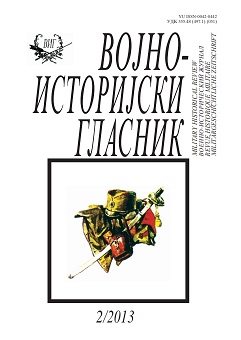Отпор и побуна приморских Словенаца у „специјалним батаљонима“
The Resistance and the Rebellion of Primorska Slovenes in “Special Battalions”
Author(s): Miha KosmačSubject(s): Military history, Political history, International relations/trade, Military policy, WW II and following years (1940 - 1949)
Published by: Institut za strategijska istraživanja
Keywords: insurrection; "special battalions"; Primorska Slovenes; "Little Man" history; Italian army; Venezia Giulia;
Summary/Abstract: Based on archival material (diary entries, memories etc.) and oral testimonies the article discusses the resistance the rebellion of Littoral Slovenes in the so called „special battalions“ of the Italian army. The first such battalions started forming after June 10, 1940, that is following Italy’s declaration of war to France, the next right before the attack on Yugoslavia in April 1941, and the final towards the end of 1942 and in February and March of 1943, all with the purpose of interning and controlling Littoral Slovenes and Istrians living in the Venezia Giulia region, whom they considered „unreliable“. This way the Fascist government of the time also intended to restrain the resistance in Venezia Giulia. Italian authorities placed special battalions in Sardinia, Sicily, southern Italy (some were also sent in Africa and Greece). Since the oral testimonies were collected among the Littoral Slovenes, the article focuses solely on the latter. The article presents different ways of individual (e. g. different forms of sabotaging the work) and collective forms of rebellion. Resistance and Rebellion of Littoral Slovenes in „special battalions“ started for many reasons. One of them was living a long period of time under Fascist regime before the mobilization. In the article we try to demonstrate that rebellion started also for other reasons or impacts: the relationships of Littoral Slovenes with their superiors, on the place of accommodation and living conditions and in Sardinia also because of the fall of Fascism. Although prohibited were also very important ties with the local inhabitants. They helped the Littoral Slovenes to obtain, especially through foreign radio stations and otherwise censured correspondence, more realistic information about the war developments in international battlefields and about the domestic situation.
Journal: Vojnoistorijski glasnik
- Issue Year: 2013
- Issue No: 2
- Page Range: 126-140
- Page Count: 15
- Language: Serbian

